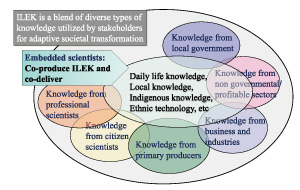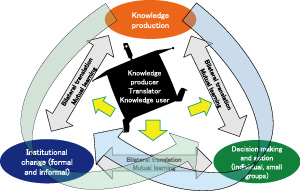Creation and Sustainable Governance of New Commons through Formation of Integrated Local Environmental Knowledge
SATO Tetsu
Ehime UniversityCo-Project Leader
KIKUCHI Naoki
RIHN>> Annual Report
>> Project's Page

【Figure 1 Structure of ILEK】
Production and circulation of ILEK is not exclusively performed by professional scientists. Rather, it is usually produced and circulated by diverse actors in local communities, including skilled workers in primary industries, local government officials, local companies and NGOs, most of them being knowledge users at the same time. ILEK is formed and utilized through dynamic interactions among different actors/stakeholders in local communities, integrating scientific and local knowledge in daily livelihood and practices among stakeholders. In this process of ILEK production, scientists and experts are assuming new roles to reorganize and integrate various knowledge systems from the viewpoints of knowledge users and co-deliver ILEK to promote collaboration among diverse stakeholders for solutions of local environmental problems

【Figure 2 Conceptual model of adaptive societal transformation (ILEK Triangle)】
The ILEK Triangle model is composed of an interactive system of three important elements of ILEK-based adaptive societal transformation (knowledge production, decision making and action, and formal/informal institutional change), driven by knowledge producers, knowledge users and translators. The pathways to achieve ILEK-based adaptive governance are postulated in this model with two different processes starting from knowledge production resulting in institutional changes via changes in individual decisions and actions, or directly influencing formal and informal institutions and human networks to transform individual behavior.
Local ecosystem services have deteriorated all over the world for various reasons. Ecosystem services should be managed by collaboration of various stakeholders, both within and from outside the communities. In order to achieve such collaborative management, the formation and circulation of local knowledge systems deeply embedded in real local settings is desperately needed. Integrated Local Environmental Knowledge (ILEK, Fig. 1), a novel concept of local knowledge blending scientific as well as various types of knowledge systems among stakeholders, is produced, circulated and utilized in diverse cases of local transdisciplinary research and actions to support adaptive societal transformations toward sustainability. Our project aimed to clarify mechanisms to facilitate production and circulation of ILEK and ILEK-based adaptive transformation of local communities. We also analyzed mechanisms of cross-scale linkages of knowledge co-production regarding global environment problems across global, regional and local scales. Through the transdisciplinary integration of these research results, we aimed to propose the design of “science for/with society” and “society making best use of science” for bottom-up solutions of global environmental problems.
The residential researchers embedded in local communities and bilateral knowledge translators bridging gaps between different knowledge systems across different spatial scales and governance levels were found to play important roles to facilitate collective actions among diverse stakeholders to promote adaptive transformations of local communities toward sustainability. We constructed a conceptual model of ILEK-based adaptive societal transformations focusing on functions of these important actors (ILEK Triangle, Fig. 2), and identified hypothetical categories of important enablers of ILEK-based adaptive societal transformations. Transdisciplinary research partnering with diverse local stakeholders opened a new TD research approach, resulted in identification of diversity and multiplicity of bilateral knowledge translations, both within local communities and/or crossing spatial scales and governance levels, as the important factors to create linkages across different spatial scales and governance levels from local to global.
ILEK project successfully produced a new model of transdisciplinary research based on the equal partnership with diverse local stakeholders to create collective actions in local communities and promoting their bottom up impacts to tackle with wicked problems regarding sustainability of local as well as global social-ecological systems. The actual processes of TD research in the project provided a new model of the solution-oriented global environmental research incorporating practical methodologies of transdisciplinary co-creation of knowledge to contribute to solutions of diverse global environmental problems. The project was conducted by transdisciplinary researchers working together with stakeholders of diverse local communities all over the world. These dedicated TD researchers in the project came together to co-produce the comprehensive standard textbook of issue-driven and solution-oriented TD research to tackle with global environmental problems through the bottom up processes from collective actions in local communities. The textbook titled “Transformations of Social-Ecological Systems: Studies in co-creating integrated knowledge toward sustainable futures” is at its final stage of production, which will synthesize the outcomes of the project to answer the ultimate research questions, namely what are the “science for/with society” and “society making best use of science” for bottom-up solutions of global environmental problems.
▲PAGE TOP